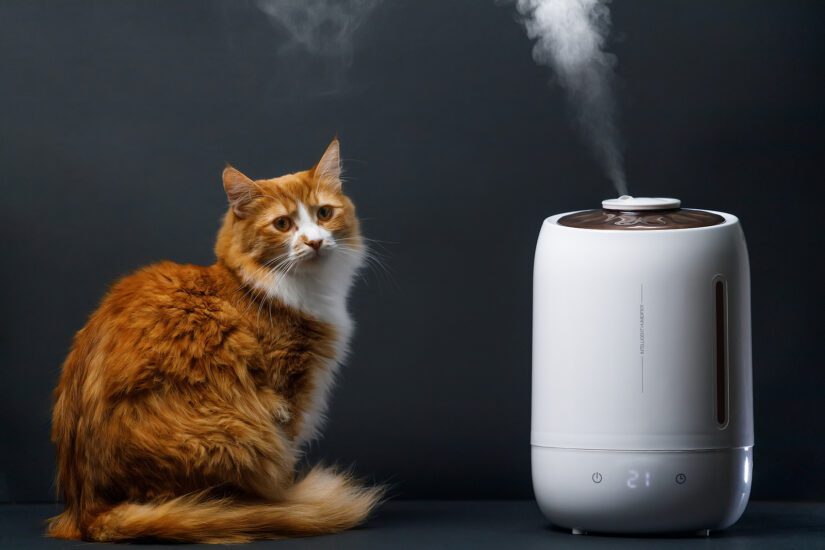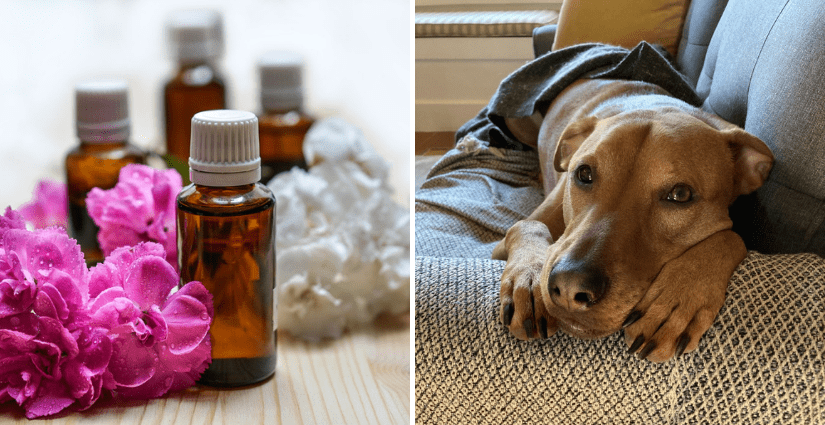Are essential oils problematic if you have pets? The short answer is yes, but the type of essential oil and its concentration play a factor in how sick your dog or cat and other pets can get.
What are essential oils?
Essential oils are concentrated plant extracts. One of the most popular is lavender, known for its calming and relaxing properties, which is used in diffusers and can be found in everything from candles to shampoos and fragrances.
How diffusers impact your pet
Active diffusers release a fine mist of essential oil and water into the air that can either be inhaled by a pet or can land on their fur and be ingested when they groom themselves. Cats and birds are particularly sensitive to aerosolized oils.

“We’ve observed a rise in essential oil toxicity in recent years, attributed to the growing trend among pet guardians to pursue holistic or natural remedies,” says Dr. Hannah Weitzenfeld, the BC SPCA’s senior manager, animal health. “Birds are particularly susceptible because of their respiratory systems and cats and other animals who self-groom are at risk of ingesting the oils. Diffusers should not be used if there are birds in the home or animals who have asthma, allergies or similar conditions.”
Dr. Weitzenfeld adds that pets who ingest small amounts of some essential oils might only suffer from gastrointestinal upset but certain oils like pennyroyal oil can cause serious liver issues. Tea tree oil is another dangerous oil that can impact the nervous system if ingested. Because of how cats metabolize the phenols found in many essential oils they are particularly at risk of serious illness.
In addition to ingestion and inhalation, pets can also experience chemical burns from direct contact of essential oils on their skin. If your pet gets oil on their skin or fur, wash it off immediately using mild, non-scented soap and water and contact your veterinarian.
It’s also important to keep in mind that cats and dogs are much more sensitive to scents. A cat’s sense of smell is 14 times better than humans while a dog’s sense of smell is 10,000 to 100,000 times more acute. What might be a pleasing scent to you can be uncomfortable to your pet.

Which essential oils are dangerous to your pet?
The Canadian Veterinary Medical Association lists the following essential oils as toxic. This is not an exhaustive list. The essential oils are listed alphabetically and not in order of toxicity.
- Bergamot (Citrus bergamia; Citrus Aurantium)
- Bitter almond (Peumus boldus)
- Calamus essential oil (Acorus calamus)
- Cinnamon
- Clary Sage
- Clove (Syzgium aromaticum)
- Eucalyptus (Eucalyptus spp.)
- European Pennyroyal (Mentha pulegium)
- Geranium oil (Pelargonium sp.)
- Horseradish (Amoracia rusticana)
- Japanese yew (Taxus spp.)
- Lavender (Lavendula angustifolia)
- Lemon oil (Citrus Lemonia) citronella
- Lemongrass (Cymbopogon citratus)
- Lime oils (Citrus aurantifolia)
- Mustard
- Orange oils (Citrus sinensis)
- Oregano (Origanum vulgare hirtum)
- Pennyroyal; American false pennyroyal (Haedeoma pulegioides)
- Pine, spruce, juniper oils
- Rose
- Rosemary
- Sandalwood
- Sassafras
- Tea tree (Melaleuca alternifolia)
- Thyme
- Wintergreen, peppermint, spearmint, mint (Mentha sp.)
- Wormseed
- Ylang Ylang

The common symptoms of essential oil poisoning in your pet include:
- Lethargy
- Diarrhea
- Vomiting
- Depression
- Drooling
- Decrease or lack of appetite
- Tremors
- Respiratory, dermal, and mucus membrane irritation
- Difficulty breathing: laboured breathing, fast breathing, panting, coughing, or wheezing
If you think your pet has ingested essential oils or is having a reaction to a diffuser, visit your veterinarian or an emergency veterinary clinic immediately. The more quickly treatment is started, the more positive the outcome.
Extra Resources:
- Doggy diet dangers: What to avoid feeding Fido
- Avoid a catastrophe: Foods that spell trouble for your cat
- Dangers of using your dog’s flea & tick medication on your cat
Get updates from the BC SPCA
Want to receive more pet tips like this, right in your inbox? Use the form below to subscribe for updates.
